Each year, seniors at Mary Baldwin University pick research, creative, or community engagement projects and work with faculty advisors, alumni, and partnering businesses, agencies, and organizations to bring them to life.
Exemplary students are invited to share their results with the Mary Baldwin community — including at special events like “Black Stars: Focus on African American Student Research” — and the annual pre-commencement Capstone Festival, which was held on April 24. Scholarship donors that couldn’t attend in person tuned into the virtual ceremony to honor the work of the recipient students, who are poised to continue achieving great things.
Below we celebrate this year’s award winners and catch up with four of MBU’s top researchers to talk about their projects, inspiration, and post-graduation plans.
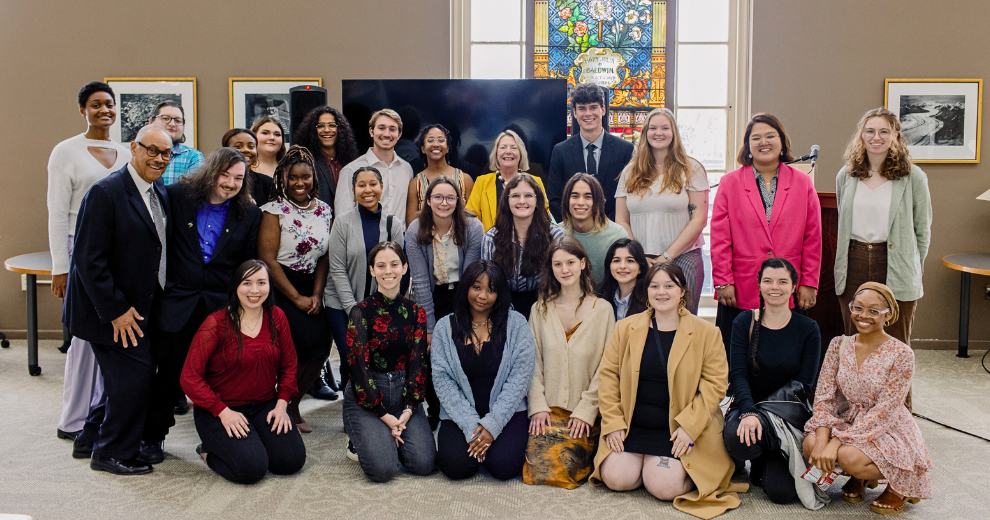
Best STEM Paper Award
Courtney Rosenstadt
“Climatic Influences on Phlox buckleyi Populations within Shenandoah National Park”
Faculty Sponsor: Kadrin Anderson
Best Social Sciences Paper Award
Heather Korzun
“Workplace Gender Inequality in the US During the COVID-19 Pandemic”
Faculty Sponsor: Jinyoung Kang
Best Humanities Paper Award
Savanna Underwood
“Surviving the Monster: Abuse, Assault, and Trauma in Dracula”
Faculty Sponsor: Katherine Turner
Best Q Paper Award
Zachary Zintak
“Designing an 8-bit Magnitude Comparator with Material Implication Using Memristors”
Faculty Sponsor: Nadine Gergel-Hackett
Best Q Poster Award
Abigail Adams
“Mycosporine-like Amino Acids: A Vital Defense Mechanism Against Ultraviolet Radiation in the Painted Sea Urchin Lytechinus pictus”
Faculty Sponsor: Paul Callo

Best STEM Poster Award
Nadia Martin
“The Effects of Curcumin on Drosophila melanogaster Models of Alzheimer’s Disease”
Faculty Sponsor: Paul Deeble
Best Humanities and Social Sciences Poster Award
Atlas Carter
“The Impact of Supposed Learning Style and Stimuli Congruency on JOLs”
Faculty Sponsor: Robin Hopkins
Best High Impact Practice Award
Megan Cuomo
“A Proposal to Implement a Youth Court Program in the Staunton-Augusta-Waynesboro Locality as a Restorative Justice Opportunity for Juvenile Offenders”
Faculty Sponsor: Paige Reed
Best Visual & Performing Arts Awards
Chasity Monique Ford
“Classical, Gifted, and Black: A Comparative Glance at Black Composers Throughout Time”
Faculty Sponsor: Anne Wick
Best Visual & Performing Arts Awards
Kijah Wilburn
“Directing Medea: The Power of Feminine Rage Through an Intersectional Lens”
Faculty Sponsor: Molly Seremet
Capstone Senior Project Fellowships for Current Juniors
Annabella Gonzales (Psychology: Robin Hopkins)
Lauryn Sitton (Environmental Biology: Kadrin Anderson)
Lukas Brown — Biology: Paul Callo)
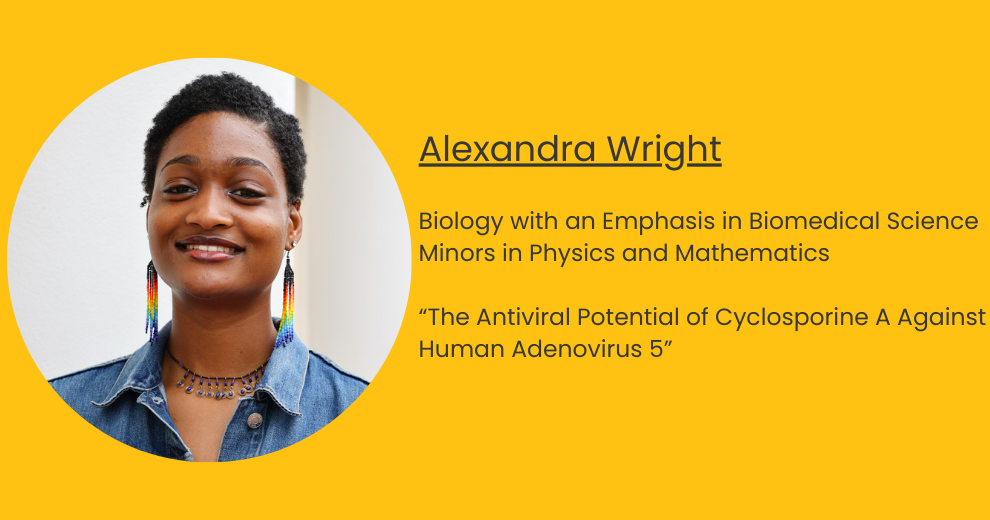
*Responses have been edited for clarity and conciseness.
Briefly describe your research? How did you get interested in this area of study?
I became interested in virology and herbal medicine during the Covid-19 pandemic, and my senior research project seemed like an excellent opportunity to explore both of these areas. I was most curious about the usage of endophytic fungi in treating viral infections.
In looking into this, I came across a drug called Cyclosporine A — which is the bioactive compound of endophytic fungi found on a particular species of medicinal juniper. The drug demonstrates antiviral activity in the human coronavirus, and I wondered if it would have the same effect on other viruses. My research thus explores the antiviral potential of Cyclosporine A against human adenovirus type 5.
I chose adenovirus because it’s extremely common and causes a broad range of illnesses like bronchitis, pneumonia, bladder infection, and even neurologic diseases. Most children contract at least one adenovirus infection by age 10. This research is important because there is no cure, specific treatment, or approved antiviral medication to treat infection.
Is there a professor who’s been particularly supportive or helpful with your research and development? If so, reflect a bit on that relationship?
Biology professor Dr. Rebecca Haberman has been especially helpful with every step of my research. Mary Baldwin doesn’t offer virology courses, so there was definitely a steep learning curve in planning and performing my experiments. Regardless, as a research advisor, Dr. Haberman was so supportive and encouraged me to work independently while also guiding me through challenging moments.
Do you think this opportunity has helped prepare you for future career success?
Conducting this senior research has taught me how to persevere through unexpected outcomes and unforeseen challenges and circumstances in the lab. As a scientist, being able to adapt quickly is an extremely important skill — and one that I will take with me into the future.
Tell us about your plans for after graduation?
After graduation, I plan to attend a post baccalaureate research program before pursuing a doctoral degree in bioengineering. In the future, I hope to design and create new technologies that can rapidly diagnose and treat diseases. Additionally, I see myself translating this research into impactful commercial products and technologies in order to increase healthcare accessibility.
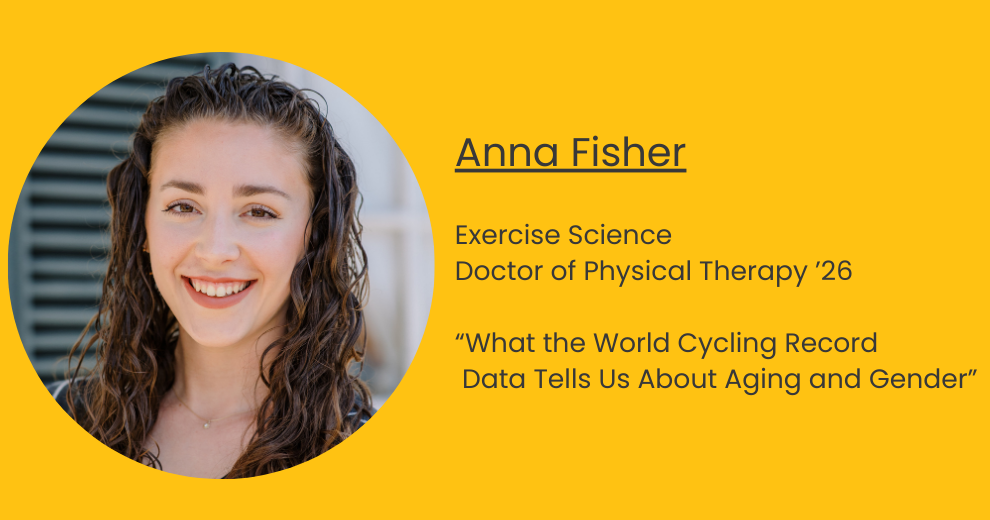
Briefly describe your research? How did you get interested in this area of study?
I’ve been working on a study that looks into what the “World Cycling Hour Record” can tell us about how aging and gender plays a role in performance for both men and women. The competition was established in 1876 and represents the maximum distance a cyclist can ride in one hour.
A comprehensive analysis of available records from the past 150 years showed that when women were compared to men, there was a 10.2 percent slower rate across all age groups. Looking at declines in performance due to aging, we found that cyclists slow by a rate of about 0.5% per year beginning at the age of 40. Interestingly, the data showed that women decline at a slower rate than men.
Is there a professor who’s been particularly supportive or helpful with your research and development? If so, reflect a bit on that relationship?
Founding exercise science director Dr. Chris Harnish has been crucial in my success here at MBU. As my advisor, he thoughtfully proposed this research project in the summer of 2022, and has been there to help guide me every step of the way. I worked closely with him and London Economics economist, Dr. Gregory Swinand, to collect data and information, and create accurate statistical analyses. Without their help this project would not have been possible.
Do you think this opportunity has helped prepare you for future career success?
Thinking about the future, I would love to keep working on projects like this over the next few years. We’re in the process of compiling our final paper and submitting it for publication in Medicine & Science in Sports & Exercise — which is the premier medical journal in my field. It would mean a great deal moving forward to have published something this prestigious while still an undergraduate.
Tell us about your plans for after graduation?
I plan to continue my education by enrolling in MBU’s doctor of physical therapy program and joining the class of 2026. It’s always been my dream to pursue a career in physical therapy, so I’m really excited to start this next chapter of my academic life.
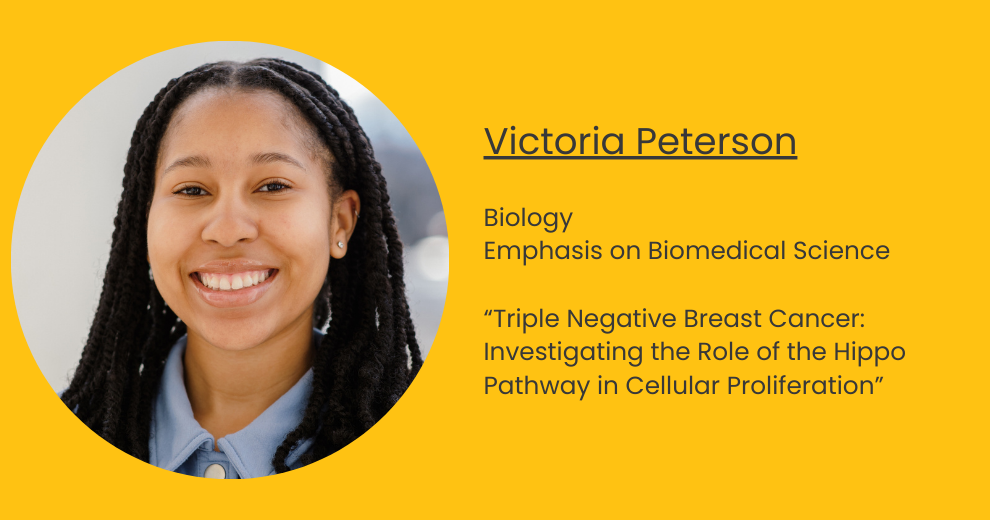
Briefly describe your research? How did you get interested in this area of study?
As a student, I’ve always been interested in cancer biology, immunology, and biomedical science. I’m also an advocate for cancer research — and am especially interested in breast cancer biology and the way Black women are disproportionately affected by the disease.
When exploring research ideas, I looked into different cancer pathways and mechanisms that were based in immunology. I took an interest in the “Hippo pathway,” and wanted to investigate its connection to breast cancer. I learned that the pathway has many effects on different cancer cell lines, but I was particularly interested in its connection to triple negative breast cancer (TNBC) — which has none of the receptors commonly found in breast cancer.
TNBC lacks receptors that control cellular proliferation, so my research targeted the Hippo pathway as a way to control its proliferation using Staurosporine, a drug that activates the Hippo pathway. My goal was to connect these three entities, and to understand how they could affect the progression of TNBC.
Is there a professor who’s been particularly supportive or helpful with your research and development? If so, reflect a bit on that relationship?
My research advisor Dr. Rebecca Haberman has been my biggest supporter. I remember struggling and feeling unconfident about my research abilities during junior seminar — the preliminary class for our thesis — and feeling nervous about senior seminar in the fall. But the moment I chose Dr. Haberman as my advisor, she welcomed me with open arms, and has been in my corner ever since.
She’s been incredibly encouraging, thoughtful, accessible, and kind throughout this whole journey. She has guided me through every single question I’ve had, through every thesis revision, and every aspect of my research. She has been such an amazing and integral part of my being able to complete this work, and I am so thankful for her.
Do you think this opportunity has helped prepare you for future career success?
The opportunity to perform an independent research project has been very beneficial. At most undergraduate institutions research is conducted in a group or cohort, and the topic is chosen by professors. So, the fact that MBU encourages each senior student to work individually with an advisor to create and undertake a custom research project is remarkable.
This project allowed me to work at something very close to the graduate level, and that has enabled me to understand what a future in medical research will look like. This project was eye-opening and has tremendously boosted my confidence about a career in biology.
Tell us about your plans for after graduation?
I’m in the process of applying to a graduate biochemistry program at North Carolina State University. In the future, I plan to pursue research in the biomedical sciences, and eventually a doctorate in medicine to focus on pediatrics.
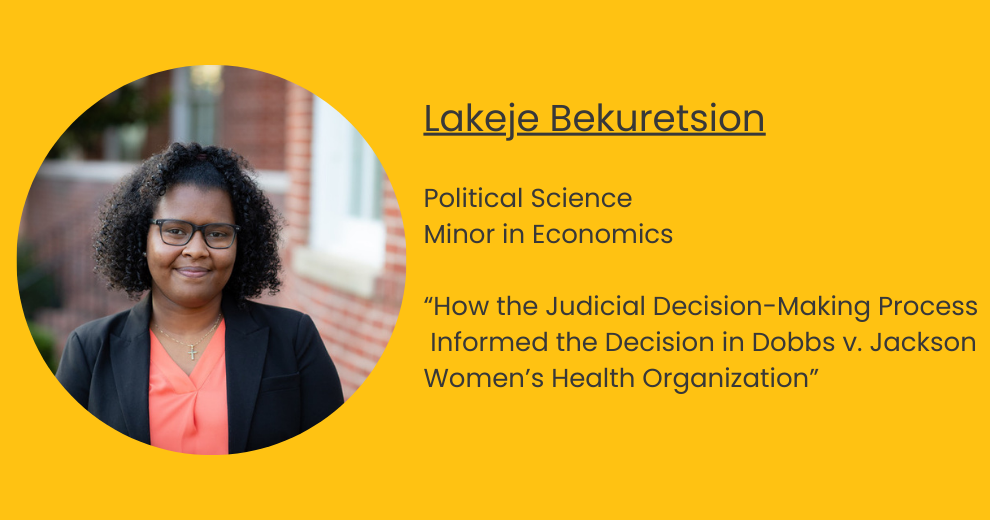
Briefly describe your research? How did you get interested in this area of study?
For this research paper I was curious about how a Supreme Court that then had the highest number of women serving as justices could lead to the overturning of Roe v. Wade. Having taken a “Women in Politics” course earlier in my college career, I knew that women’s opinions on both abortion rights and women’s rights as a whole were split. Working on a paper comparing conservative and liberal female judges ultimately led me to create a profile for each of the supreme court justices and analyze factors in judicial decision making, including gender.
Is there an MBU professor who’s been particularly supportive or helpful with your research and development? Can you reflect a bit on that relationship?
Political science professor Dr. Laura van Assendelft worked with me on this paper every step of the way. She was a guiding light in the process and helped me flesh out my initial ideas around research. She’s been my advisor since I declared my major, and I’ve always appreciated her honesty towards me regarding how I can improve both my work and myself.
Do you think this opportunity has helped prepare you for future career success?
This work challenged me to utilize every skill that I’d learned so far in my college career. As someone who intends to go to law school, the research required to produce this work was a big step toward building the skills I need to realize my aspirations of becoming a working lawyer.
Tell us about your plans for after graduation?
I plan to gain some legal experience by interning in the Washington D.C. political sector before applying to and attending law school. Once I earn my J.D., I will pursue a career in corporate law so that I can combine my interests in economics and the legal field.
Mary Baldwin University’s 2023 Capstone Festival was held on April 24 in Grafton Library and Hunt Gallery.